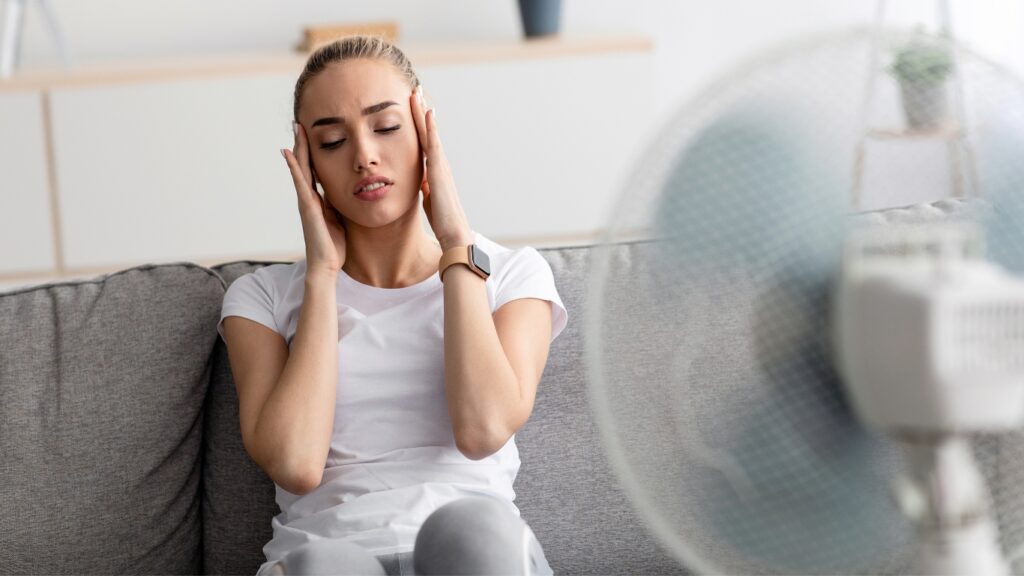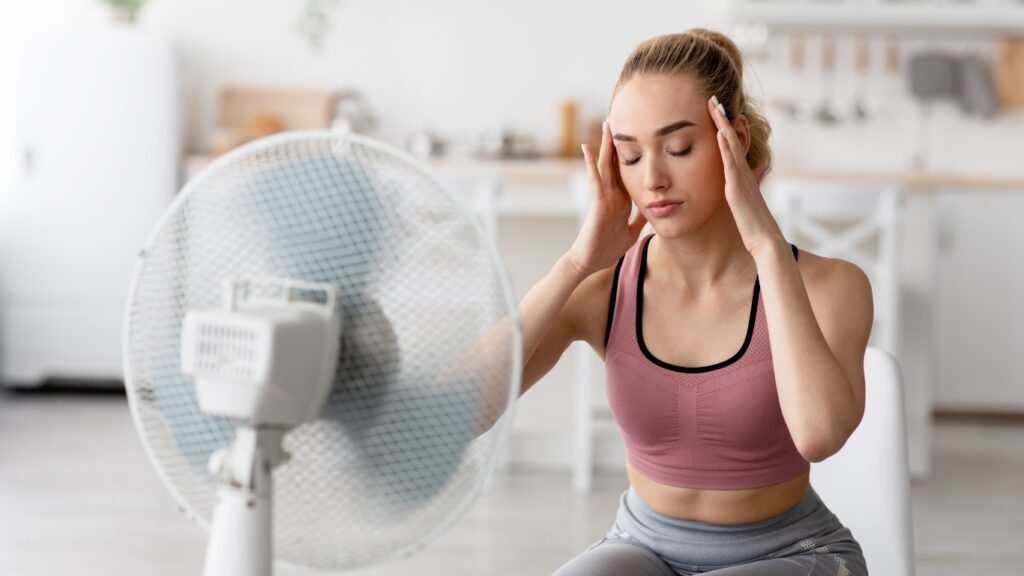
Heat waves can have significant adverse effects on health, posing a serious risk to vulnerable populations. Prolonged exposure to extreme heat can lead to heat-related illnesses including heat exhaustion, heat cramps, and heat stroke, which can be fatal if not promptly treated. Mental health can also be seriously impacted, as the stress of coping with prolonged heat can contribute to anxiety and depression. In densely populated urban areas, the heat island effect can increase these health risks.
The relationship between heat and mental health is a growing area of concern and research, especially in the context of climate change. Various studies have shown that extreme heat can have significant impacts on mental health in many ways:
Increased Stress and Anxiety:
High heat causes discomfort both indoors and outdoors. The discomfort and physical strain caused by heat can lead to irritability, restlessness, and low productivity. Motivation levels and socialising opportunities are less too. All these can increase stress levels and cause anxiety.
Worsening of Existing Mental Health Conditions:
People with pre-existing mental health conditions, such as depression, anxiety, bipolar disorder, and schizophrenia, may find their symptoms worsening during heatwaves.
Heat and Aggression:
Research suggests a correlation between higher temperatures and increased aggression and violence. This can lead to higher rates of crime and domestic violence during heatwaves.
Cognitive Function:
Extreme heat can impact mental processing and decision-making abilities. This can affect daily tasks and reduce productivity.
Sleep Disturbances:
High night time temperatures can disrupt sleep patterns, leading to sleep deprivation, which is closely linked to mood disorders and decreased cognitive function.
Suicidal Behaviour:
Some studies indicate a rise in suicide rates during periods of extreme heat. The reasons are complex and multifaceted, involving both physiological and psychological stressors.
Medication Interference:
Many psychiatric medications can impair the body’s ability to regulate temperature, increasing the risk of heat-related illnesses. Additionally, dehydration and electrolyte imbalances can affect the efficacy and side effects of these medications.
Vulnerable Populations:
Certain populations, including the elderly, children, people with existing illnesses, and low-income communities, are more vulnerable to the mental health impacts of heat. They often have limited access to cooling resources, recreational activities, and healthcare.

Why does Heat impact Mental Health?
Physiological Stress: Heat stress can activate the body’s stress response, releasing stress hormones such as cortisol, which can affect mood and anxiety levels.
Inflammation: Heat exposure can increase inflammatory responses in the body, which have been linked to depression and other mental health disorders.
Disruption of Daily Routines: Heatwaves can disrupt daily life, limit outdoor activities, and increase social isolation, all of which can negatively impact mental well-being.
Socioeconomic Factors: Heat can strain public health systems, reduce work productivity, and increase financial stress, particularly in communities with inadequate infrastructure to handle extreme temperatures.

Coping with hot weather anxiety and stress
Coping with anxiety and stress during hot weather requires a combination of practical strategies and self-care practices to maintain physical and mental well-being. Here are some effective approaches:
Stay Cool and Hydrated: Ensure you drink plenty of water to stay hydrated. Use fans, air conditioning, or cool showers to keep your body temperature down. Wearing light, breathable clothing and avoiding strenuous activities during peak heat can also help.
Create a Comfortable Environment: Use blinds or curtains to block out the sun and keep your living space cool. Consider spending time in cooled, air-conditioned public places like malls and clubs for recreation.
Mindfulness and Relaxation Techniques: Practice mindfulness, meditation, or deep-breathing exercises to manage stress. These are particularly helpful in calming your mind and reducing anxiety.
Stay Informed and Prepared: Stay updated on weather forecasts and heat advisories. Knowing what to expect can help you plan your activities and reduce anxiety about the unknown.
Limit Caffeine and Alcohol: Caffeinated drinks and alcoholic cold drinks can feel hydrating and cooling but in reality, they contribute to dehydration and increase anxiety.
Pay attention to diet and nutrition: People tend to eat poorly during heat waves. You do not feel like looking in a hot kitchen too. Plan your meals properly, so that you do not spend too much time in a hot kitchen. Avoid the consumption of too much sugary aerated drinks for hydration. Add hydrating foods like cucumber, watermelon, and musk melon to your diet. Drink nutritious and cooling drinks like aam panna, bel sharbat, shikanji, etc to feel hydrated and active.
Engage in Relaxing Activities: Reading, listening to music, playing board games, or engaging in any hobbies you enjoy can distract you from the heat and help reduce stress.
Maintain a Routine: Keeping a regular schedule for meals, sleep, and exercise can provide a sense of normalcy and stability.
Connect with Others: Talking to friends, family, or support groups about your feelings can provide emotional support. Knowing you are not alone in your experience can be reassuring.
Adopt Healthy Sleep Habits: Ensure your sleeping environment is cool and comfortable. Use light bedding and keep windows open if safe to do so or use fans to circulate air.
Surround yourself with greenery: Urban areas do not have many trees. Plants have a calming effect on the mind and can have a positive impact on mental health. Try to stay in an area which has good greenery. If not, at least plant a good no of plants in your house and balcony.
By incorporating these strategies, you can better manage the anxiety and stress associated with hot weather, helping you stay both physically and mentally healthy.
Apart from this, efforts are required at the community level and planning levels.
Public Health Interventions: Increasing awareness and preparedness for heatwaves is important. There should be mental health resources and support efforts by the government and NGOs in the public interest to help people manage these times effectively.
Community Cooling Centres: Establishing accessible cooling centers for vulnerable populations can be a great idea.
Urban Planning: Designing cities with more green spaces and shaded areas is important to handle heat waves. Public places can have water fountains and sprinklers too to create a cooling effect.
Access to Healthcare: Ensuring that mental health services are available and accessible, especially during extreme weather events.
If your anxiety and stress become overwhelming, consider speaking to a mental health professional for guidance and support.